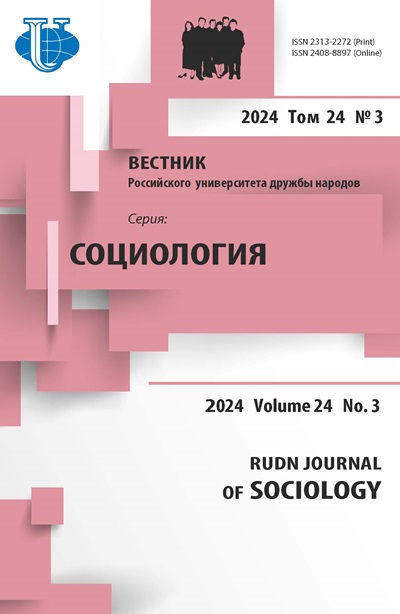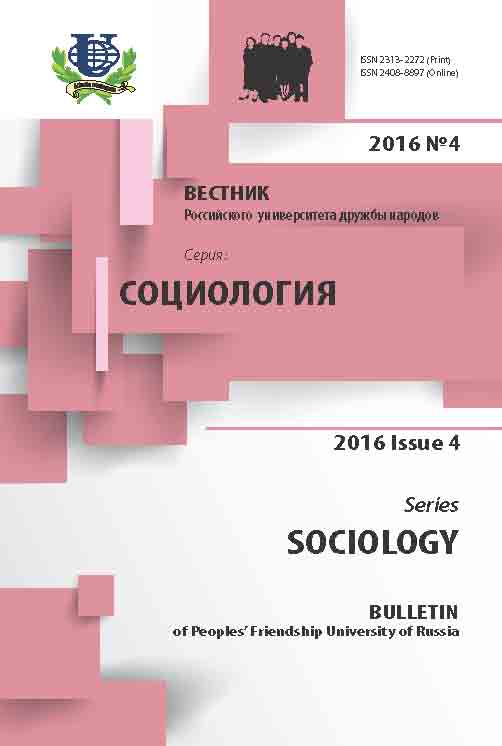Крупнейшее мировое социологическое исследование ценностей: организация, методология, результаты и опыт реализации в странах СНГ
- Авторы: Херпфер К.1, Кизилова К.А.2
-
Учреждения:
- Институт политологии Университета Вены
- Харьковский национальный университет им. В.Н. Каразина
- Выпуск: Том 16, № 4 (2016)
- Страницы: 719-741
- Раздел: Вопросы истории, теории и методологии
- URL: https://journals.rudn.ru/sociology/article/view/14806
Цитировать
Полный текст
Аннотация
Всемирное исследование ценностей - международный проект, призванный оценивать влияние ценностей на стабильность или изменчивость параметров социального, политического и экономического развития стран и обществ. Проект был создан в 1981 г. Рональдом Инглхартом и его командой и за время своего существования вовлек в свою орбиту более ста стран мира, превратившись сегодня в крупнейшее некоммерческое сравнительное (трендовое) эмпирическое исследование верований и ценностей человечества. Статья состоит из нескольких разделов, фокусирующихся на разных аспектах данного международного проекта. В первом разделе авторы описывают методологию и организацию проекта, обеспечивающие его сравнительные возможности на международном и региональном уровне (опрос проводится на основе единого инструментария, с помощью метода личного интервью и на базе схожим образом сконструированных выборок). В следующем разделе статьи представлен краткий обзор истории проекта через перечисление уже реализованных его «волн» (это периоды длительностью от двух до четырех лет, в течение которых в ряде стран собираются данные по единому инструментарию; промежуток между волнами составляет пять лет). Авторы описывают каждую волну, отмечая особенности их организации, позволившие существенно расширить исследование тематически и географически. Далее в статье обозначены ключевые характеристики Всемирного исследования ценностей в странах СНГ, а также некоторые его результаты за период с 1990 по 2014 гг., в частности: высокий уровень неопределенности в ответах населения о своих идеологических предпочтениях; быстрый рост декларируемой религиозности; разрыв между декларируемыми ценностями и реальным социальным поведением и т.д. Заключительный раздел статьи представляет читателям основные результаты международного проекта и ключевые публикации, поскольку его эмпирические данные широко используются для оценки экономического и политического развития, религиозных верований, гендерного равенства, социального капитала, субъективного благополучия и многих других аспектов социального развития и изменения ценностей.
Об авторах
Кристиан Херпфер
Институт политологии Университета Вены
Автор, ответственный за переписку.
Email: c.w.haerpfer@gmail.com
Австрия
Ксения Александровна Кизилова
Харьковский национальный университет им. В.Н. Каразина
Email: ksenniya.kizilova@gmail.com
Харьков, Украина
Список литературы
- Inglehart M. Foreword. Pushing the envelope - analysing the impact of values. Dalton R., Welzel C. (eds.) The Civic Culture Transformed: From Allegiant to Assertive Citizens. Cambridge University Press, 2014.
- Inglehart R. The silent revolution in Europe: Intergenerational change in post-industrial societies. American Political Science Review. 1971. Vol. 65.
- Inglehart R. et al. World Values Surveys and European Values Surveys, 1981-1984, 1990-1993, and 1995-1997. University of Michigan, Institute for Social Research, ICPSR 2790, 2000.
- Inglehart R. et al. World Values Surveys and European Values Surveys, 1999-2001. User Guide and Codebook. University of Michigan, Institute for Social Research, ICPSR 3975, 2004.
- Materials from the Eurobarometer official web-site, 2016. URL: http://ec.europa.eu/ COMMFrontOffice/PublicOpinion.
- Materials from the official EVS web-site, 2016. URL: www.europeanvaluesstudy.eu.
- Materials from the WVS-1 questionnaire, 1981. URL: www.worldvaluessurvey.org.
- Materials from the WVS-2 questionnaire, 1990. URL: www.worldvaluessurvey.org.
- Materials from the WVS-3 questionnaire, 1995. URL: www.worldvaluessurvey.org.
- Materials from the WVS-4 questionnaire, 2000. URL: www.worldvaluessurvey.org.
- Materials from the WVS-5 questionnaire, 2005. URL: www.worldvaluessurvey.org.
- Materials from the WVS-6 questionnaire, 2010. URL: www.worldvaluessurvey.org.
- Materials from the WVSA Constitution, 2014.
- Materials from the WVSA official web-site, 2016. URL: www.worldvaluessurvey.org
- Materials from the WVSA organization brochure WVS 1-5, 2009. URL: www.worldvaluessurvey.org.
- Materials from the WVSA organization brochure WVS 1-6, 2015. URL: www.worldvaluessurvey.org.














